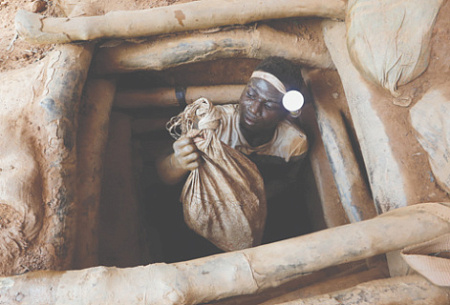
In a strategic pivot away from the US dollar, China is aggressively expanding its gold mining operations across the Global South, seeking to insulate its economy from potential sanctions and bolster its influence in the international financial system. This state-backed push has seen Chinese companies establish a significant presence in developing nations like Indonesia, Ghana, and Mali, vaulting China to seventh place in global gold reserves, just behind Russia.
The environmental and social costs of this rapid expansion are becoming starkly visible. On the Indonesian island of Lantung, for instance, reports describe a landscape scarred by Chinese-funded operations, where hills are stripped bare by excavators and trenches overflow with chemical runoff. Local communities, who have long practiced small-scale artisanal mining, now watch as vast resources are extracted, with one local gold trader noting, “We don’t know where they will take the gold. We only know it won’t stay here.”
The campaign extends far beyond Indonesia, representing a coordinated global strategy. Chinese mining interests are increasingly active across Asia, Africa, and Latin America, often operating in regions with weak regulatory oversight. These efforts have attracted criticism, with a UN Office on Drugs and Crime report warning that organized crime has deeply infiltrated gold supply chains, creating a threat of global proportions and seeking connections with Chinese mining entities.
International scrutiny is intensifying. The United States has officially designated gold as a vital mineral to reduce dependency on foreign suppliers, while a US congressman has accused China of being the largest beneficiary of the illicit gold trade. Similarly, a French government-funded think tank identified Chinese investors as key players in the illegal gold market in French Guiana, framing it as part of a “global context of resource capture encouraged by the Chinese government.” In response to such activities, at least 15 countries have initiated legal proceedings against Chinese companies and nationals since last year.
Beijing has forcefully rejected these accusations. The Chinese ambassador to Ghana, for example, labeled connections between China and illegal mining as “grossly unfair.” Officially, Chinese experts maintain that bolstering the nation’s gold reserves is a critical measure for ensuring national security. This view is supported by data from the World Gold Council, which confirms China has been one of the world’s most significant gold purchasers over the past decade.
Despite the scale of its acquisitions, China’s gold holdings, currently at approximately 2,294 tonnes, remain dwarfed by those of the United States, which holds over 8,133 tonnes. While Beijing’s pursuit of gold signals a clear and determined strategy to de-risk from the dollar-dominated global system, the data suggests that any immediate threat to America’s standing as the world’s largest holder of the precious metal is still a distant prospect.
